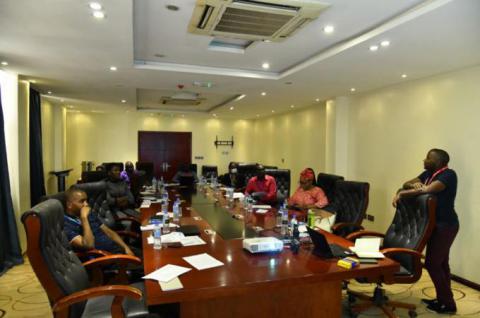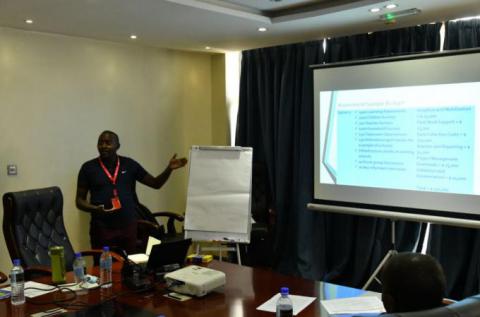Stakeholders discuss how to document learning outcome assessment for South Sudan with support from ECW
Stakeholders during the inception meeting in Juba. Photo: Daniel Danis/Save the Children
December 14, 2021, Juba - South Sudan - The Ministry of General Education and Instruction and development partners are moving closer to finalizing the terms of reference document which will enable the collection of a Joint Learning Outcome Assessment in South Sudan.
The proposed assessment seeks to generate 2021 baseline data on the levels of literacy and numeracy skills among learners in South Sudan. It will also act as a baseline through which interventions towards enhancing education outcomes in South Sudan will be assessed - especially focusing on learners’ well-being.
Education Cannot Wait is supporting the initiative to kick-start discussions on conducting the learning outcome assessment for South Sudan.
A one-day inception workshop was held on Monday, December 14, 2021, to provide an opportunity for participants to capture the final round of comments and feedback from the stakeholders and at the same time provide an opportunity to validate the Terms of Reference.
The participants are drawn from the Ministry of General Education and Instruction (MOGEI), Save the Children International, UNICEF – GPE, UNESCO, JICA, Windle Trust International, Windle Trust International, Norwegian Refugee Council, and Finn Church Aid. In attendance also are directors from the Ministry of General Education and Instruction.
The stakeholders explored key learning questions, scope and looked at lessons learned from the previous learning assessments in South Sudan. They further studied a proposed work plan, including timelines for rolling out a request for proposal.
“[The inception workshop] will give the green light to Ministry of General Education Instruction and stakeholders to engage in the next course of action for the assessment," said Edwin Kimani, Multi-Year Resilience Programme MEAL Manager.
When the coronavirus pandemic was reported in South Sudan in March 2020, the education sector was heavily disrupted across the country – leaving children with very limited prospects of maintaining any form of learning at home. The literacy rates among children in South Sudan continue to be among the lowest in the world. The majority of the children classified among categories of marginalization which in turn deprives them the access and retention to school which would ultimately improve their levels in the education outcomes.
Since the reopening of schools in May 2021, the Ministry of General Education and Instruction and partners have endeavored to ensure that all learners recover and make up for any learning losses experienced during the lockdown.
“This assessment will study the numeracy and literacy assessment, gaps on learning outcomes data, explore on factors affecting the progress of learning, build on developing a capacity strengthening framework for MOGEI in conducting learning outcomes assessment, and present recommendations on enhancing learning outcomes among learners,” Mr. Kimani stated.
Edwin Kimani facilitating the inception meeting. Photo: Daniel Danis/Save the Children
The assessment framework will further include inception and mobilization, fieldwork support, data collection, analysis and reporting, validation, and dissemination.
The stakeholders at the inception workshop pledged to harness commitments from all stakeholders on funding for the learning outcomes assessment.
They resolved to present the outcome of today’s meeting to the Ministry of General Education and Instruction in order to validate the document and share input on quality control.
"The proposed national assessment will offer a critical background for future formative assessments on learning. The exercise will be guided and led by the Ministry of General Education and Instruction who will convene the Assessment Technical Working Group to coordinate the study," Kimani concluded.
About ECW/MYRP
Education Cannot Wait is the first global multilateral fund dedicated to education in emergencies and protracted crises. Through the South Sudan Multi-Year Resilience Programme (MYRP), ECW project aims at ensuring that out-of-school children (OOSC) in priority areas have flexible, responsive routes into learning opportunities, that support their transition into further levels of education and that support their holistic wellbeing and development. The project also focuses on increased access to learning opportunities, improved quality and continuity of education, enhanced school safety, mental health, psycho-social support, gender and inclusive education.
Save the Children International, Norwegian Refugee Council (NRC) and Finn Church Aid (FCA) as grantee agencies work together with 17 Implementing Partners across 6 States in South Sudan – under the leadership of the Ministry of General Education and Instruction.
Story by Daniel Danis/Save the Children
Edited by Tito Justin/Save the Children
 South Sudan
South Sudan 
